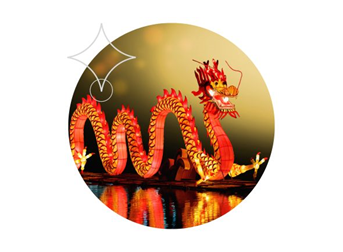Happy Year of the Dragon
Chinese New Year falls on Saturday, 10th February this year. The date of the festival changes annually because it follows the lunar calendar rather than the Gregorian calendar. Generally, it falls between mid-January and mid-February and welcomes a new animal of the Chinese Zodiac.

Happy year of the Dragon
6 minute readChinese New Year is widely celebrated across China, and with a population of nearly 1.5 billion and over two million nationals living overseas, it’s a huge celebration, not just in China but across the world. The celebration can last for 15 days, with many businesses closing down and Chinese people enjoying an extended holiday over the period.
Interest in China and Chinese culture has been growing over the last few years. And at Moneycorp, this is reflected in the year on year increase we’ve seen in our Yuan dealings. This trend is likely to continue in 2024. With China’s zero-covid policy abandoned in December, we are bound to see the country’s economic activity ramping up once more.
To celebrate, we hope to expand your general knowledge around China, the Chinese people, and Chinese New Year, bringing us a little bit closer to the most populous country on earth.
Full Name: The People’s Republic of China
Population: 1.412 billion
GDP: 17.73 trillion USD (2021) (1)
Currency: Yuan (or Renminbi)
Capital City: Beijing
Area: 9,596,960 km²
We’re entering the year of the Dragon
Actually, it’s the year of the Wood Dragon. In Chinese culture, the Dragon sign is a symbol of authority, prosperity and good fortune, with 2024’s Wood Dragon predicted to bring evolution, improvement and abundance, for a year for auspicious opportunities and exciting advancements for all.
Twelve animals make up the 2000-year-old Chinese Zodiac - Rat, Ox, Tiger, Rabbit, Dragon, Snake, Horse, Sheep, Monkey, Rooster, Dog and Pig. These represent years in China and, much like the western astrology, are believed to influence people’s personalities, careers, compatibility, marriage, and fortune. Consequently, the Chinese Zodiac can affect birth rates in China, with the year of the Dragon (regarded as a symbol of good luck) seeing a sharp increase in the annual birth rate, while the year of the Tiger tends to see a slump.
In Chinese astrology, dragons are highly revered mythical creatures People born in the year of the Dragon are believed to be confident, generous, idealistic, and ambitious as well as being independent thinkers and successful businesspeople.
There are two Chinese currencies
The ‘renminbi’ (RMB), or people’s money, is more commonly known as the Yuan - which is the principal unit of RMB. One Yuan can be divided into 100 fen or ten jiao. It’s issued exclusively by the People’s Bank of China and is ranked the fifth most traded currency in the world.
What’s less well-known is that there are two different Yuan markets. The ‘onshore RMB’ is traded solely within Mainland China, and the ‘offshore RMB’ circulates outside Mainland China.
The Government of China controls the onshore Yuan (CNY). This allows the government to empower trade between Chinese businesses and maintain the value of the Yuan. The offshore Yuan (CNH) is valued and controlled by the free market and can be freely traded in offshore markets like Singapore and Hong Kong. It also means that while foreign businesses can receive payments in CNY, they will need to exchange it for the offshore Yuan to use outside the country.
China is the second largest economy
China is the second largest economy (2) (second only to the United States (3)) and the world’s fastest-growing economy, increasing by around 10% (4) over each of the last three decades. It’s the largest producer of 220 industrial products, including steel, concrete, vehicles, and computers (5).
China is also the world’s largest agricultural producer (6). With the third largest country in the world by land mass (7), it hosts less than 10% of the world’s arable farmland but manages to produce a quarter of the global grain output (8). In 2000, China was still almost entirely self-sufficient when it came to its food requirements but has been relying more on imports during the last two decades.
China is home to the oldest of the major world civilisations
The earliest known written records date back to the Shang dynasty in 1250 BC, but some historians believe the first Xia dynasty could have been formed as early as 2250 BC.
The country is steeped in history. The teachings of Confucius, China’s most famous and influential philosopher, are still present in Chinese culture today, and we still use many Chinese inventions across the globe.
Here are some of the most important Chinese inventions that have shaped the world today:
Paper
Paper has been vital for the spreading of knowledge throughout history. It was invented in China, where it was widely used for wrapping and padding from 200 BC, and by the 3rd century, paper was commonplace as a writing medium.
For many years the first example of the use of paper for writing could be dated back to AD 105 during the Han dynasty, but a recent archaeological discovery dates its use all the way back to 8 BC.
This paved the way for the first printers - and the first mass marketing of information - in China between AD 618 and 906.
The Compass
Before the compass, travellers relied on the positioning of the moon, stars, and sun to navigate. This made travelling difficult during when there was bad weather, or even cloud cover.
The first iterations of a compass had an overwhelming influence on our ancestor’s ability to trade, explore, and exchange knowledge. Its origins can be traced back to a direction pointer discovered from the Warring States period in China between 476 and 221 BC and the use of naturally magnetized magnetite, called a lodestone, can be traced back to the Han dynasty from 200 BC.
Versions of the compass continued develop until AD 1088 when a book by Shen Kuo featured a reference to the first magnetic needle compass.
Gunpowder
The origin of gunpowder can be traced to its use in fireworks in China. Chinese alchemists invented it on a quest for an elixir of immortality in the 9th century before it was repurposed for us as an explosive in canons, fire arrows, and other incendiary weapons.
Gunpowder was perfected in the mid-14th century when its use in wars and battles began to shape the world as we know it today.
If you or your business is interested in learning more about the Chinese foreign exchange market or doing business in China, then get in touch with us today. We can help you navigate the complex global payments market using smart technology, an intuitive payments ecosystem, and a commitment to personalised service and regulatory excellence.
None of the information contained in this article constitutes, nor should be construed as financial advice. Moneycorp is a trading name of TTT Moneycorp Limited and is authorised by the Financial Conduct Authority under the Payment Service Regulations 2017 (reference number 308919) for the provision of payment services.


